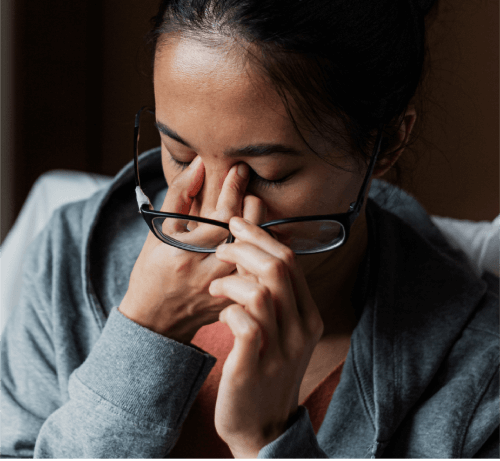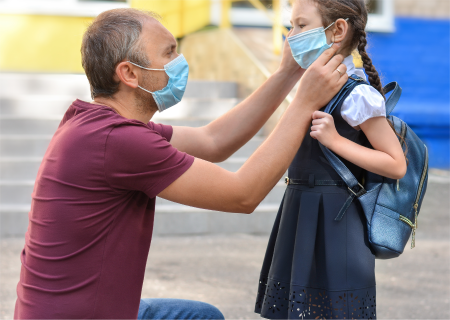Respiratory Illnesses
The flu, RSV and COVID-19 can be dangerous to your family and friends – especially to our seniors and little ones. But you can protect who you love by following some simple steps.
- Wash your hands many times a day
- Cover your mouth when you sneeze or cough
- Open windows to let fresh air into your home or use an air purifier
- If you’re sick, stay home and away from others
- If you’re sick, get tested and talk to your doctor about taking medicine
- Wear a mask so it’s harder to get a virus from someone else or give it to someone else
If you are sick with a respiratory illness
Stay home and away from others until at least 24 hours after
- Your symptoms are getting better AND
- You are fever free (without medications)
When you go back to your normal activities, take added precautions over the next 5 days to protect who you love.
Respiratory illnesses affect the lungs and airways. Anyone can get a respiratory illness, but there are ways to protect yourself from infection. Learn about the preventative measures you can take to avoid respiratory illnesses.
Influenza (Flu)
Flu is a common illness caused by influenza viruses that infect the nose, throat, and sometimes the lungs. It can cause mild to severe illness, and at times can lead to death. The best way to prevent flu is by getting a flu vaccine each year.
How Influenza Spreads
- People with flu cough, sneeze, or talk, and tiny droplets leave their mouth and nose
- People nearby breathe in the tiny droplets, or touch the tiny droplets on objects or surfaces and then touch their faces
- The people who breathe in the tiny droplets get infected with flu
People can spread flu before they even know they are sick, as well as when they are sick with symptoms. The time between being infected and showing symptoms is between one and four days.

How to Avoid Influenza
Anyone can get flu, and it can lead to serious medical conditions and complications like pneumonia, ear infections, sinus infections, and worsening of medical conditions you may already have. The best ways to avoid flu are getting vaccinated, wearing a mask in public, and staying away from sick people.
You can avoid catching and spreading flu by:
- Getting a yearly flu vaccine
- Wearing a mask in public to protect your mouth and nose
- Staying home when you are sick, even if you don’t have COVID-19
- Avoiding close contact with sick people
- Washing your hands often
- Covering your coughs and sneezes
- Cleaning and disinfecting surfaces
- Avoiding touching your face with unwashed hands
COVID-19
COVID-19 is a very contagious disease caused by a virus. Symptoms of COVID-19 can feel like a cold, flu, or pneumonia, but it may also affect other parts of the body. It can cause severe illness and have extreme effects like Long COVID after the disease has passed, even with minor or no symptoms. Over a million people have died from COVID-19 in the United States.
Vaccines against COVID-19 are safe and effective. Anyone over the age of 6 months should get the updated 2024-2025 vaccine released in September 2024.

How COVID-19 Spreads
There have been over 100,000,000 cases of COVID-19 in the US since 2020. COVID-19 spreads when:
- People with COVID-19 cough, sneeze, or talk, and tiny droplets leave their mouth and nose
- People nearby breathe in the tiny droplets, or touch the tiny droplets on objects or surfaces and then touch their faces
- The people who breathe in the tiny droplets get infected with COVID-19
Anyone infected with COVID-19 can spread it, even if they do NOT have symptoms. COVID-19 spreads very quickly.
How to Avoid Becoming Very Sick from COVID-19
The best way to avoid severe illness from COVID-19 is staying up-to-date with vaccines. Anyone over the age of 6 months should get the updated 2024-2025 vaccine released in September 2024.
You can avoid catching and spreading COVID-19 by:
- Staying up-to-date with COVID-19 vaccines
- Wearing a mask in public to stop droplets from reaching your mouth and infecting you
- Staying home when you are not feeling well, even if you have not tested positive for COVID-19; avoiding people who are sick
- Getting tested immediately if you have symptoms; testing five days after exposure if you do not have symptoms
- Seeking treatment through your doctor, local pharmacies, and health clinics
COVID-19 Resources
Request a vaccination record for yourself or your legal dependent at the CT WIZ public portal:
The NHV Health Department tries to monitor groups or clusters of COVID-19 cases in the city. Help us out by reporting a cluster in a business, organizations, daycare, long-term care facility (LTCF), or New Haven Public School:
Respiratory Syncytial Virus (RSV)
Respiratory Syncytial Virus, or RSV, is a common virus that affects the lungs and breathing passages. RSV can be serious, especially for infants and older adults. Most children have had it at least once by age 2.
RSV usually causes the same symptoms as a bad cold, such as a cough, stuffy/runny nose, sore throat, earache, and fever. Babies with RSV may also have no energy and less appetite than usual, and wheeze or have difficulty breathing.
How RSV Spreads
A virus causes RSV infection. Like the flu virus, RSV affects your nose, eyes, throat, and lungs. It spreads like a cold too – when you cough, sneeze, or share food or drinks or touch infected surfaces.
People can spread RSV before they start showing signs of being sick, and can continue to spread it for as long as four weeks after they stop showing symptoms.
How to Avoid RSV
Doctors can provide new immunizations to protect infants, toddlers, and adults 60 years and older from RSV.
Other ways to protect yourself and your family from catching and spreading RSV are staying home when sick, avoiding sick people, washing your hands, covering coughs and sneezes, and cleaning surfaces in your home.
Reach out to your child’s doctor or pediatrician if they have RSV symptoms.
Tuberculosis (TB)
Tuberculosis (TB) is caused by a bacterium. The bacteria usually affect the lungs, but they can impact any part of the body.
There are two tuberculosis-related conditions:
- Latent TB infection (LTBI): when someone is infected with TB bacteria, but does not become sick
- TB disease: when someone does become sick, which can be fatal if not treated properly
How Tuberculosis Spreads
- People with TB disease cough, sneeze, or talk, and tiny droplets full of TB bacteria leave their mouth and nose
- People nearby breathe in the tiny droplets
- The people who breathe in the tiny droplets get infected with TB bacteria
Tuberculosis only spreads this way when someone has TB disease in the lungs or throat. TB in other parts of the body is usually not infectious.
TB is NOT spread by shaking hands, sharing food or drink, sharing toothbrushes, touching bed linens or toilet seats, or kissing.
People with TB disease are most likely to spread it to people they spend time with every day. This includes family members, friends, and coworkers or schoolmates.
What to Do if You Are Exposed to TB
If you think you have been exposed to someone with TB disease, contact your doctor or the NHV Health Department about getting tested.
Remember that if you were exposed to TB bacteria, you are not able to spread the bacteria to other people right away. Only people with active TB disease can spread TB bacteria to others.
Some people develop TB disease within weeks of becoming infected, while other people may get sick years later. Many people with TB infection never develop TB disease.
Common Cold
The common cold is a minor infection that affects the nose and throat. There are over 200 different viruses that can cause the common cold. Colds usually have minor symptoms and get better within a week, but they can have bad side-effects, like sinus infections.
Colds are very easy to spread, but there are ways to avoid catching them.
How Colds Spread
- Infected people cough, sneeze, or talk, and tiny droplets leave their mouth and nose
- People nearby breathe in the tiny droplets, or touch the tiny droplets on objects or surfaces and then touch their faces
- The people who breathe in the tiny droplets get infected with a cold
People can spread flu before they even know they are sick, as well as when they are sick with symptoms. The time between being infected and showing symptoms is between one and four days.
How to Avoid Colds
There are easy ways to avoid catching and spreading colds. Some of the strategies to protect yourself and others are very similar to the ways you can avoid COVID-19 and flu. Remember that even if symptoms are mild for you, they can be much worse for someone else.
You can avoid catching and spreading colds by:
- Washing your hands for at least 20 seconds or using hand sanitizer
- Wearing a mask in public to protect your mouth and nose
- Staying home when you are sick, even if you don’t have COVID-19
- Avoiding close contact with sick people
- Covering your coughs and sneezes
- Cleaning and disinfecting surfaces
- Avoiding touching your face with unwashed hands
